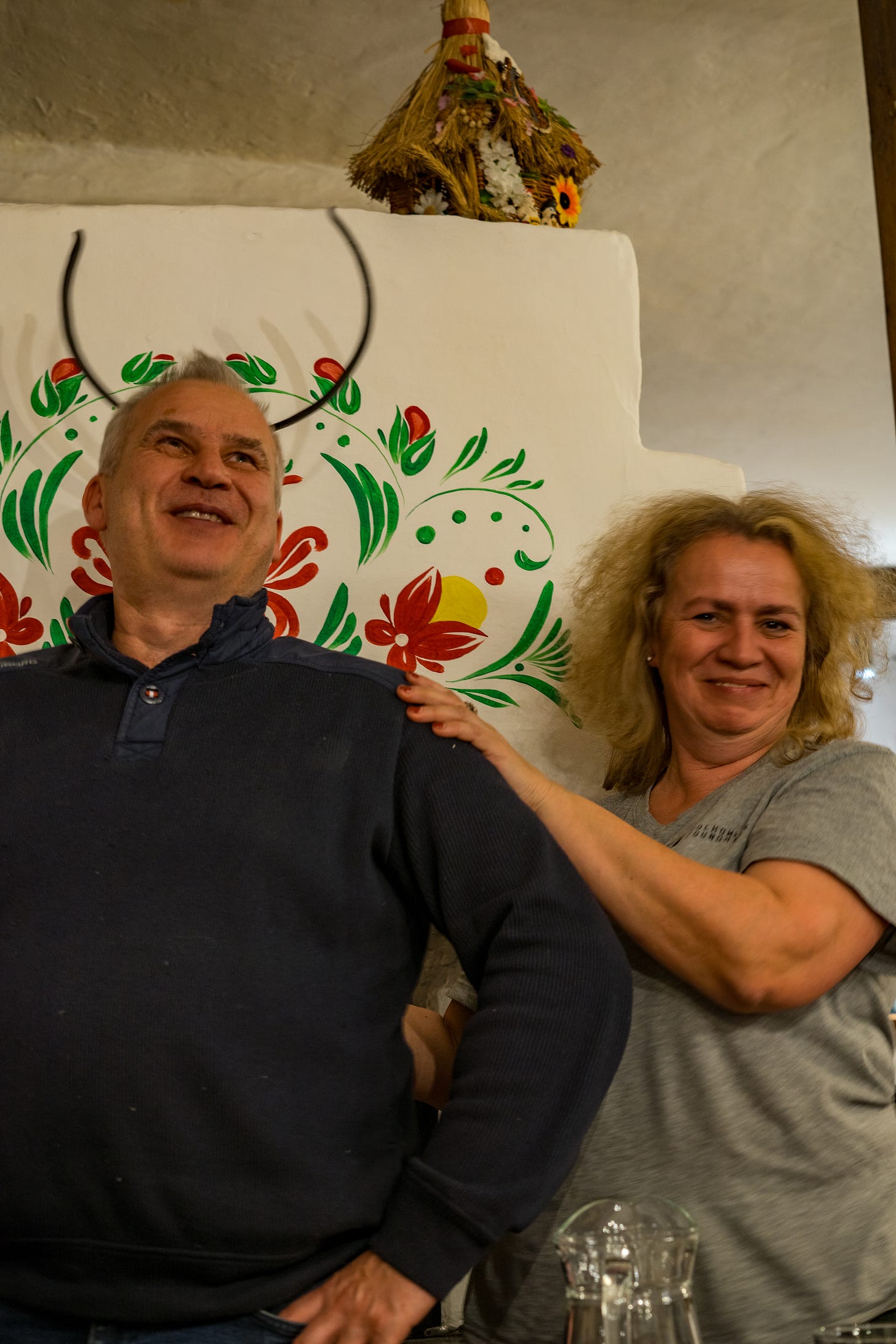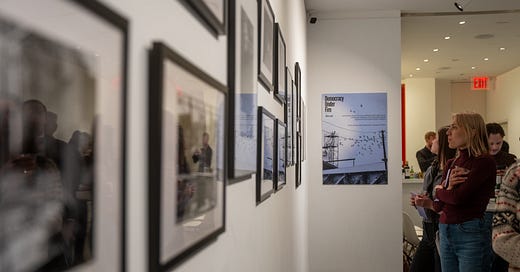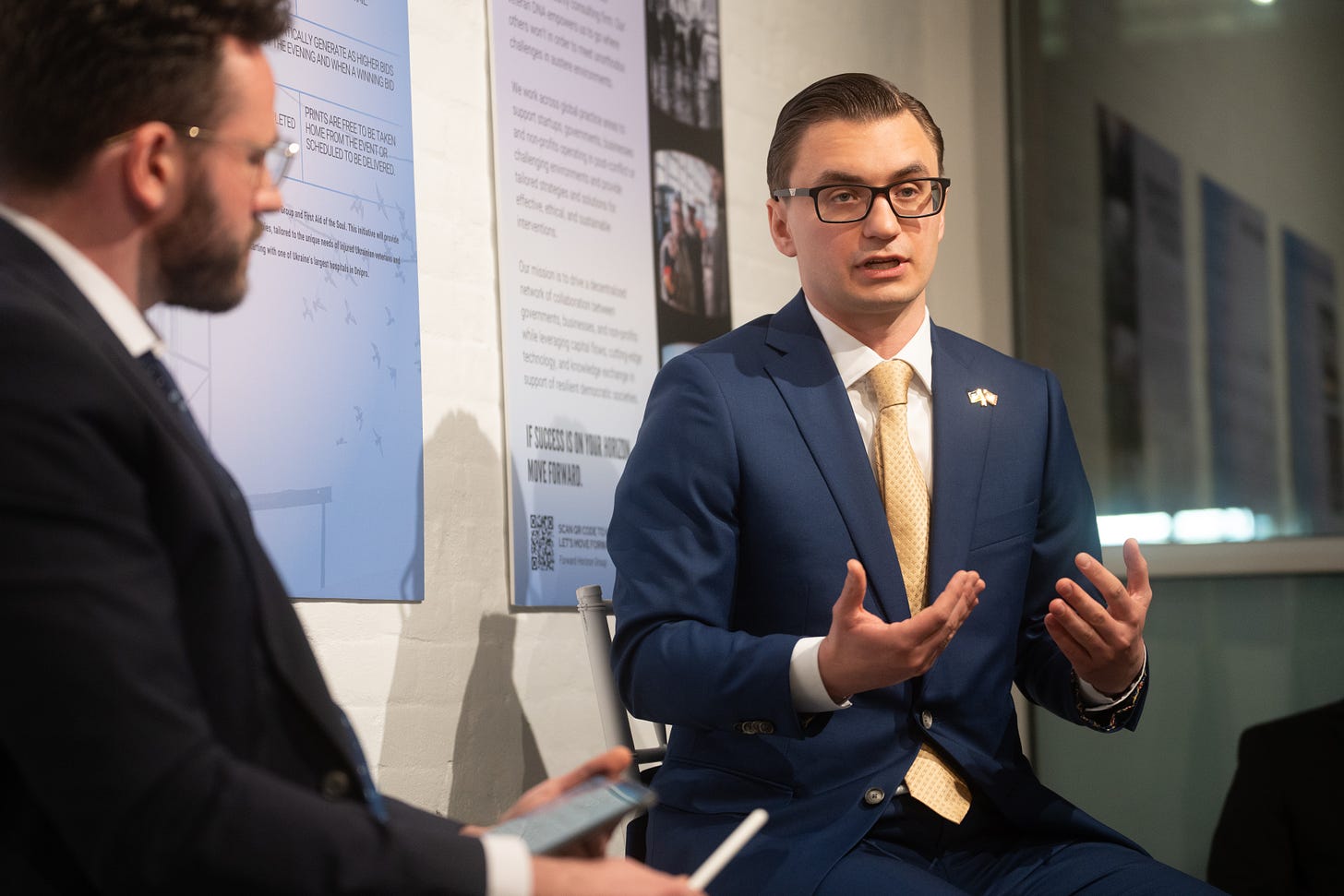Democracy Under Fire:
Good afternoon everybody and a friendly welcome (!) to all of our new readers onboarding after last week’s excellent Democracy Under Fire event hosted by Forward Horizon Group (FHG) and First Aid of the Soul. For those who don’t know, Forward Horizon Group is a frontier markets and security consulting firm that supports democratic resilience by, among other things, leveraging emerging technology and working with non-profits, while First Aid of the Soul (FAS) is an American-based NGO that provides mental health services in Ukraine.
While the event's silent auction is closed, you can still support the joint FAS-FHG mental health project by donating here. You can also support the Folkowisko Foundation, an equally impressive NGO in Poland that provides humanitarian assistance to Ukrainians (and helped make this event possible by providing our team access to vast swaths of Ukraine) through donations here.
This newsletter is powered by Forward Horizon Group’s unique Research and Intelligence Practice.
A highlight of the evening for me was getting to sit down and speak with Ilya Timtchenko, a member of First Aid of the Soul board, who I first met in a coffeeshop in Kyiv. Ilya is such a wealth of knowledge on the challenges facing Ukraine, from security and intelligence to economics and energy issues, I want to highlight some of his writing as follow-on reading for anyone who might be interested in learning beyond the scope of last Friday’s event.
Democracy Under Fire is the first in a long line of events we’re planning at FHG in order to highlight our practice areas and partners. These events give us the ability to simultaneously build a community of people who are interested in coming together to create impact, as well as communicate the high stakes of international issues that are all too often only seen through the prism of US politics and media.
Using photography to raise funds for a mental health organization, to my mind, speaks to the indelible connections between art, culture, mental health, and resilience. The act of free expression is so fundamental to a healthy democracy - art in all its forms exists as a way for the individual to participate in some small way, in telling the story of a place, a people, or a institution. Authoritarians are seized by the desire to control history, as evidenced by Putin’s history lessons or the CCP’s war on “historical nihilism”, in hope that they may, in turn control the future. Giving people the power to choose the direction of their community and to tell their own stories, in my mind, is fundamental to standing up to authoritarians everywhere.
Solidarity and Hope:
Every trip I’ve taken to Ukraine started with a trip to Poland. Flights to Warsaw, or Krakow, then some combination of trains, buses, and drivers until you reach Poland’s eastern border. Since the full-scale invasion in 2022, Poland has taken in an influx of Ukrainian refugees, supported efforts at the European Union to create a multi-year fund for Ukrainian military aid, and overcome domestic political rivalries to lobby Washington for more aid.
One of our partner organizations, Folkowisko, is funded in part by grants from the Kościuszko Foundation, an American non-profit dedicated to promoting Polish-American affairs and exchange.
The Foundation is named after Tadeusz Kościuszko, a Polish military officer who, raised and educated during the Enlightenment, joined the Continental Army upon the outbreak of the American Revolutionary War. Kościuszko served as a military engineer throughout the war, fighting from North Carolina to New York, even helping create some of West Point’s early fortifications. He retired back to Poland after the war, and in his last year on earth, emancipated the Polish peasants who worked his land. When he died, in 1817, his will dictated that his assets be returned to the US and used to fund the freedom and education of American slaves.
Poland and Ukraine share the same overlooked history of 20th century Europe, as large countries caught between violent great powers, with Poland invaded by both Nazi Germany and the USSR in 1939. When World War 2 ended, the Soviets controlled both the military and the government of country, and they would rule over the country throughout the Cold War.
While violence conquered Poland, an unlikely combination of protest, organized labor, and religion would liberate it in the 80s. In 1971, Polish philosopher Leszek Kołakowski wrote an essay entitled Theses on Hope and Hopelessness in which he asserted that self-organized social groups could gradually expand the spheres of influence in a totalitarian state. He was promptly exiled from the country, but his writing became a major influence on the events to come.
Solidarity (Solidarność in Polish) was a trade union that was founded in the Gdansk Shipyard in August of 1980 and used civil resistance methods to promote social change and workers rights.With Communist leadership unable to push back as easily against a trade union as they had other social protest groups, Solidarity membership skyrocketed, with over 10 million members by 1981. Their success attracted support from an unlikely trio of organizations: the AFL-CIO, the US Government, and the Catholic Church.
The AFL-CIO supported its fellow labor union through million-dollar grants, while the USG gave Solidarity the tools of the free press such as printers, pamphlets, and ink, first surreptitiously through the CIA, and then later through the newly formed National Endowment for Democracy. Underground printings of Kołakowski’s work began to proliferate, Polish Communist leadership declared martial law in an attempt to crush the movement, declaring membership illegal and throwing its leadership in jail. Nonetheless, Solidarity continued on as an underground resistance movement.
When Pope John Paul II, the first Polish pope, visited the country in June of 1987, Solidarity took over the national television signals and broadcast a 10 minute message articulating the itinerary of the Pope’s visit. Millions and millions of poles turned out, galvanizing the movement and forcing the government to negotiate with Solidarity. Finally, on June 4th 1989, the government allows legislative elections to occur, and Solidarity candidates win roughly 99% of the vote, one of the few peaceful transitions away from Communism. This stands in stark contrast to what was happening in Tiananmen Square on the very same day.

There was never any direct contact between the AFL-CIO, the USG, and the Catholic Church, but it has always struck me how this decentralized model of influence, when aligned behind shared values, represents a powerful model for change. To consider this in concert with the Revolutionary Kościuszko, or the Babushkas who kept me stuffed with Borscht and Bimber throughout my most recent trip to Ukraine, or the current International Legion fighting in Ukraine, is to consider the global appeal of freedom, and what it stirs in people’s hearts. Even the name, Solidarity, speaks to something eternal and unbending, an ethic of neighborly-ness that I have seen time and time again extended from the Poles to their neighbors under siege to the East.
Terror in Moscow:
Last Friday, March 22, four gunmen carried out a mass shooting at the Crocus City Music Hall in the suburbs of Moscow. The ISIS affiliate in Afghanistan quickly took credit for the attack, which killed upwards of 130 people, the worst terrorist attack on Russian soil since 2004. On March 7th, the US Embassy in Moscow went public with a warning that US citizens in Russia should avoid large gatherings in Moscow, specifically concert venues, citing reports that extremists were planning to imminently target such events. Vladimir Putin dismissed those warnings, asserting “these actions resemble outright blackmail and the intention to intimidate and destabilize our society”. In the aftermath of the attack, Putin acknowledge that the attacks was likely committed by radical Islamists, but left the door open to Ukrainian involvement or responsibility for the attacks, while his security apparatus minced no words in blaming Ukraine for the attack.
"We believe the action was prepared both by the radical Islamists themselves and, obviously, facilitated by Western special services. Ukraine's special services themselves have a direct connection to this." - Alexander Bortnikov, Director of the FSB
This is a stark example of how terrorists and authoritarians use fear to the same ends, to defray our ability to see each other as people, and encourage other-ing. They prevent solidarity by using narratives to create a world where there is always a threat around the corner, and your neighborhood simply cannot be trusted if they look differently, think differently, or pray differently than you.
Concepts & Frameworks:
Last week, the accomplished Israeli-American economist Daniel Kahneman passed away at the age of 90. He was best known for his work on behavioral economics, decision-making, and the psychology of decision making. He won the Nobel Prize in Economics in 2002 and helped develop prospect theory.
Prospect theory is an excellent heuristic for analyzing decision making because it prescribes that individuals weight potential gains and potential losses differently. Additionally, the theory asserts that individuals are more sensitive to perceived loss, than to equivalent gains, and identifies this concept as “loss aversion”. This has implications for things like financial markets, which rely on the buy/sell logic driven by wisdom of crowds, or international affairs, where singular, influential decision makers can be responsible for the fate of millions.
More Interesting Reading:
The Return of the Tactical Crisis - The Modern War Institute
We’re in a war right now, Britain’s former Spy Chief Warns - Politico






